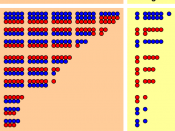The Electoral College
The Electoral College process is part of the original design of the U.S. constitution. The Electoral College was devised by the
Founding Fathers to elect the president and vice president. In this essay I will asses whether the system is democratic. I shall do
this by discussing its strengths, weaknesses and attempts to reform it.
The Electoral College system has been criticised many times since its establishment. It is seen to contain weaknesses for not fully
serving American democracy. The main problem is that the system clearly has the potential to frustrate the electorate. Because of
the aggregation of the electoral votes by state, it is possible that a candidate might win the most popular votes but lose in the
Electoral College voting, this happened 3 times in the 19th century, but also in the presidential elections of 2000. Although Gore
gained nearly half a million more votes than Bush he didn't gain enough electoral votes to win.
The winner-take-all system literally
means that the candidate team that wins most of the plurality votes in a particular state gets all of the electoral votes in that state,
and the loser gets none, even if the loss is marginal. For example, all 54 of California's electoral votes go to the winner of that
state election, even if the margin of victory is only 50.1% to 49.9%.
Another weakness in the system is the possibility of "faithless electors" who defect from the candidate to whom they are pledged.
Twenty- six states have no requirement that electors vote in accordance with the popular vote. Nineteen states and D.C. mandate
that they vote in accordance with the popular vote but, there's no penalty if an elector fails to do so. Only 5 states have penalties
for deviating from the popular vote,
